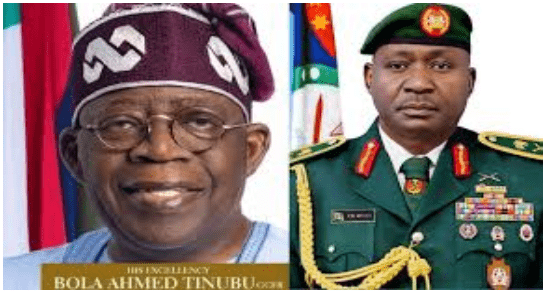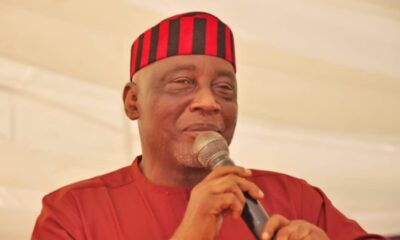National Issues
Okuama and Abuja – Military Intrusion vs. Civilian Fragility – What Comes Next? -By John Egbeazien Oshodi
In an ideal democratic framework, the pivotal role of the police in managing civilian affairs encompasses crucial tasks such as investigations, arrests, and overseeing legal proceedings, all while ensuring strict adherence to legal standards and civilian oversight.

Upholding Civilian Governance: Exposing the Risk of Military Intrusion in Nigeria – Scrutinizing Okuama and Abuja while Envisioning the Nation’s Path amidst Military Interference and Civilian Vulnerability – Unforeseen Consequences
In the intricate jumble of Nigerian society, a disquieting narrative unfolds—one that speaks of unchecked military might permeating civilian domains, casting a foreboding shadow over the precarious balance of governance. Recent tumultuous events have thrust the military’s incursions into civilian affairs under a glaring spotlight, revealing a pressing need to safeguard civilian governance and stem the advancing tide of military overreach that threatens to undermine fundamental democratic principles.
While no one accuses the military of trying to usurp the current civilian government, psychologically taking drastic actions like seizing these human and business communities, even if temporary, is deeply worrisome as it raises troubling questions about what could come next.
The haunting scenes witnessed in Okuama community, Delta State, and the heart of Abuja, where lives were tragically lost and livelihoods disrupted, stand as poignant reminders of the vulnerability of civilian spaces amidst military interventions. The stark images of women and children seeking solace in the wilderness of Okuama, and traders forcibly restrained from their businesses at Banex Plaza, paint a vivid and disconcerting picture of the human suffering and economic turmoil wrought by military actions in civilian spheres.
The civil activist Omoyele Sowore’s fiery denunciation of the Nigerian Army’s abrupt closure of Banex Plaza reverberates with a thunderous call for accountability and justice. His impassioned critique cuts through the cloak of military authority, exposing the unjust suppression of civilian spaces by armed forces—a grievous affront that strikes at the very essence of democratic ideals and civil liberties.
The chilling revelations unveiled by Femi Falana, a stalwart civil rights lawyer, paint a disturbing picture of human rights violations in Okuama community. His urgent plea to the Attorney-General resonates with a sense of impending crisis, underscoring the desperate need to stem the tide of eroding legal norms and constitutional rights in the face of unchecked military power.
The cases of Okuama and Abuja offer a stark portrayal of the intricate complexities that arise from military interventions in civilian affairs. Within a truly democratic context, the delineation of law enforcement responsibilities typically rests with the police, thereby underscoring the importance of maintaining the separation of powers and upholding the distinct roles of civilian and military institutions. However, the military’s apparent dual roles as both prosecutor and judge, as evidenced in these incidents, serve as a cautionary tale, shedding light on the dangers inherent in consolidating power and blurring the boundaries between military and civilian functions.
In an ideal democratic framework, the pivotal role of the police in managing civilian affairs encompasses crucial tasks such as investigations, arrests, and overseeing legal proceedings, all while ensuring strict adherence to legal standards and civilian oversight. However, the Nigerian landscape presents a distinctive challenge where military involvement in civilian matters raises valid concerns about accountability, transparency, and the preservation of democratic norms. This intersection of military encroachment in civilian domains emphasizes the urgent necessity to rebalance power dynamics, reinforce democratic principles, and protect the integrity of civilian governance against encroaching military influence.
Psychologically, the bedrock of democracy in Nigeria now stands on a fragile precipice, unsettled by the military’s audacious encroachment into civilian domains, stirring waves of discord and uncertainty. A disquieting narrative unfolds—one where the military, through undermining the presidency and established law enforcement systems, may harbor a growing belief that the current civilian leadership regards them with suspicion. This perception, if allowed to fester, could embolden the military with an unjust sense of entitlement in their interactions with civilians, fostering an atmosphere rife with impunity and disdain towards civilian authority. The haunting echoes of past authoritarian regimes reverberate in the actions of present military leaders, serving as a chilling harbinger of the gradual erosion of democratic pillars. While historical precedence may not have witnessed such brazen behavior from military figures, the recent surge in military visibility across civil media and direct involvement in civilian affairs, as exemplified in the recent incidents, raises alarming red flags. As a psychologist, this unsettling shift demands urgent scrutiny and contemplation to decipher its implications on the delicate fabric of Nigerian democracy.
President Tinubu stands at a pivotal crossroads, facing the daunting task of navigating through treacherous waters characterized by a looming military dominance and fragile civilian authority. His responsibility in reining in military overreach, asserting civilian control, and upholding the bedrock of democratic principles carries profound weight in fortifying the democratic infrastructure and safeguarding the rights of civilians from the encroaching grasp of unchecked military power. The unchecked actions of the current military leadership cannot be allowed to persist unchecked. The question lingers, what might be the ominous next step if this trajectory continues unabated?
In this tumultuous crucible, a resounding call echoes—a call to arms to safeguard democratic tenets, uphold human rights, and staunch the hemorrhage of military interventions that threaten to unravel the delicate fabric of civilian governance. While the government led by President Tinubu must tread cautiously in navigating these sensitive matters, they must also remain vigilant and proactive.
The harmonizing voices of legal luminaries and rights activists in sounding alarms against military overreach underscore the paramount need for accountability, transparency, and unwavering fidelity to the rule of law in safeguarding the sanctity of civilian authority amidst encroaching military oversteps.
As Nigeria grapples with the specter of military overreach, the imperative to uphold democratic values, honor legal norms, and protect human rights becomes increasingly urgent. The intricate dance between civilian governance and military influence demands a delicate balancing act to avert the precipice of authoritarianism and uphold the sanctity of democratic ideals in the face of encroaching military dominance. The collective chorus of dissent, the legal intricacies laid bare, and the resounding call for restraint resonate as steadfast pillars of resilience in the face of looming threats to civilian authority and democratic governance.

John Egbeazien Oshodi
Professor John Egbeazien Oshodi, born in Uromi, Edo State, Nigeria, is an American-based police and prison scientist, forensic psychologist, public policy psychologist, and legal psychologist. He’s a government advisor on forensic-clinical psychological services in the USA and the founder of the Dr. John Egbeazien Oshodi Foundation for Psychological Health. With a significant role in introducing forensic psychology to Nigeria through N.U.C. and Nasarawa State University, he’s also a former Secretary-General of the Nigeria Psychological Association. He’s taught at esteemed institutions like Florida Memorial University, Florida International University, Nova Southeastern University, and more, and is currently an online faculty member at Weldios University, Nexus International University, and Walden University. John.Oshodi@mail.waldenu.edu










